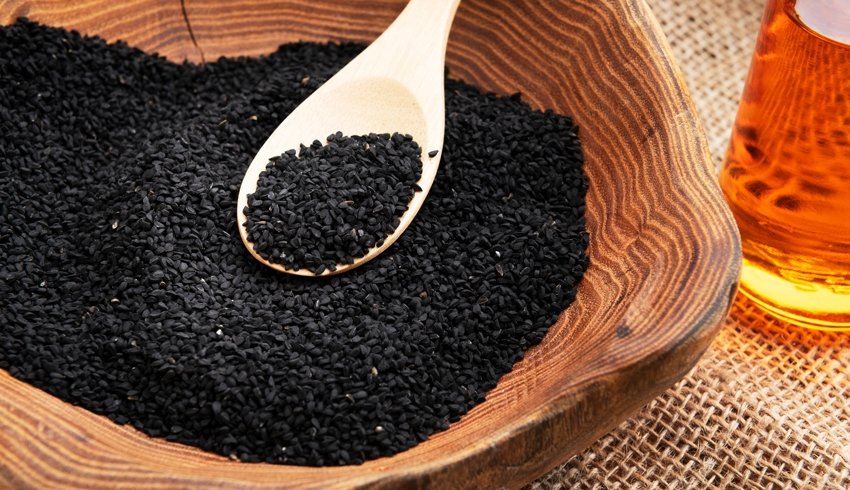Do you like to be the first to learn about new trends? Then you’ll want to learn about black seed oil. Although not a new ingredient, black seed oil, also known as black cumin seed oil, has recently become a highly sought-after ingredient in skin care—and for good reason.
This ancient herbal oil, which graced Cleopatra’s skin, is traditionally used throughout the Middle East, Africa and Asia. and is now gaining worldwide recognition for its remarkable skin benefits. Let’s explore its various applications and gain practical knowledge on how to incorporate black seed oil into your daily skin care routine.
What is black seed oil? | Beauty benefits | Health benefits | Way of use | Supplements
What is black seed oil?
Black Seed, an annual flowering plant, is native to Western Asia and parts of Europe (mainly Bulgaria and Romania). Ancient civilizations, including those of Egypt and Mesopotamia, valued the black seed for its versatility, using it not only in the kitchen but also for pharmaceutical properties. The real magic is inside its fruit, which houses numerous small, black, triangular seeds that contain powerful nutrients such as linoleic acid, oleic acid and thymoquinone. Packed with antioxidants, antibacterial properties and omega fatty acids, black seed oil can be used to fight acne and reduce clogged pores, as well as a source of hydration. Let’s delve into the specific beauty benefits of black seed and how its oil can be a transformative element in your skin care routine.
Beauty benefits of black seed oil
Worried about clogged pores? While some oils have a reputation for making congestion worse, you don’t need to worry with black seed oil. Thanks to its antibacterial and anti-inflammatory properties, black seed oil can clear up symptoms associated with clogged pores—think excess oil production and blemish formation. Azadeh Shirazi, MD., says a board-certified dermatologist Forbes that black seed oil can potentially relieve the symptoms of skin conditions such as psoriasis, eczema, vitiligo and acne. Black seed oil is also known for its benefits for your hair and scalp health. The phytochemicals in black seed oil strengthen hair from root to tip, reducing breakage and split ends, while providing hydration to revitalize dry and brittle hair.
To understand the magic of black seed, we need to look at its basic ingredients. The two most important are linoleic acid and thymoquinone. Linoleic acid, an omega-6 fatty acid, reduces excess sebum production that can lead to acne, possibly due to its antimicrobial and anti-inflammatory properties. Meanwhile, thymoquinone takes on the role of anti-spot guard, providing a preventative measure for clearer skin. Thymoquinone is known for its antioxidant, antimicrobial and anti-inflammatory properties, which enhance the oil’s ability to reduce the appearance of clogged pores. Together, these ingredients help address the appearance of clogged pores and reduce their formation.
Health benefits of black seed oil
While there is limited research on the health effects of black oil, existing studies suggest that it may have beneficial effects. Here are some notable insights from the current research, according to Healthline:
- Enhances wound healing
- Supports the maintenance of hair health
- Helps reduce acne
- Helps reduce inflammation
- Improves blood sugar management
- Contributes to the treatment of vitiligo
- Relieves the symptoms of eczema
- Helps treat psoriasis
- It reduces the risk of metabolic syndrome
With these potential health effects of black seed oil in mind, let’s explore how you can effectively incorporate it into your skin care routine.
How to use black seed in your skin care routine
Now that you know the benefits of using black seed oil, here are some tips for incorporating black seed oil into your routine:
- First patch test: Before applying black seed oil to your face or body, do a patch test on a small area of skin.
- Use to treat your scalp: You can also apply black seed oil to your scalp before washing to nourish your scalp and promote healthy hair growth.
- Dilute the oil: If you use black seed oil straight, consider diluting it with a carrier oil such as coconut, jojoba, or sweet almond oil, especially if you have sensitive skin.
- Dab blemishes with a cotton swab: Because of its antimicrobial properties, black seed oil can be applied to acne spots with a cotton ball to help reduce inflammation and clear blemishes. Consult your dermatologist before applying this oil to your skin.
- If you have skin conditions: Likewise, if you have conditions such as eczema or psoriasis, consult your dermatologist before applying this oil to your skin.
Supplements: How Much Black Seed Oil Should I Take?
Doing a patch test on new skin care products is enough for most, but when it comes to ingesting black seed oil, we recommend consulting a doctor before starting any supplement to confirm it’s right for your personal health needs.
Usually, adults can consume 1 to 2.5 grams of black oil by mouth every day for a period ranging from four to 12 weeks. Alternatively, black seed powder is usually taken in doses of one to two grams daily for eight to 12 weeks. To determine the most effective dosage for a particular health condition, it is recommended that you speak with a healthcare professional.
Is black seed right for you?
With its historical accolades and modern recognition, the black seed offers an enticing proposition. While black seed is generally considered safe and well-tolerated, it is necessary to be aware of possible allergies, either when it is ingested or when applied topically. For those who are pregnant, nursing or taking medication, it is vital to seek medical advice before including black seed in your routine.
Looking to improve imperfect skin or switch up your skincare routine with natural products? Visit your local Eminence Organics Spa partner to find out how.
